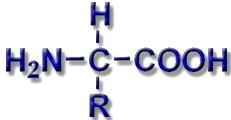Amino Acids
Amino acid functional groups are important coordination sites for metal ions in biological systems. This is true for free amino acids as well as for peptides and proteins.

Alpha amino acids have special biological importance. All of the ca. 20 proteinogenic amino acids are alpha amino acids. They all contain (with the exception of glycine) at least one asymmetrical carbon atom. Thus, each has a D and an L form. Only the L-amino acids are proteinogenic.
All proteins in the natural world are built from their connection through amide bonds.
In aqueous solution, free amino acids exist as zwitter ions. At a given pH value, the isoelectric point, the acids are neutral to their environment.

Depending on additional acidic, pH-neutral or basic substituents in the side chain R, the amino acids are grouped into neutral, basic, and acidic amino acids.
